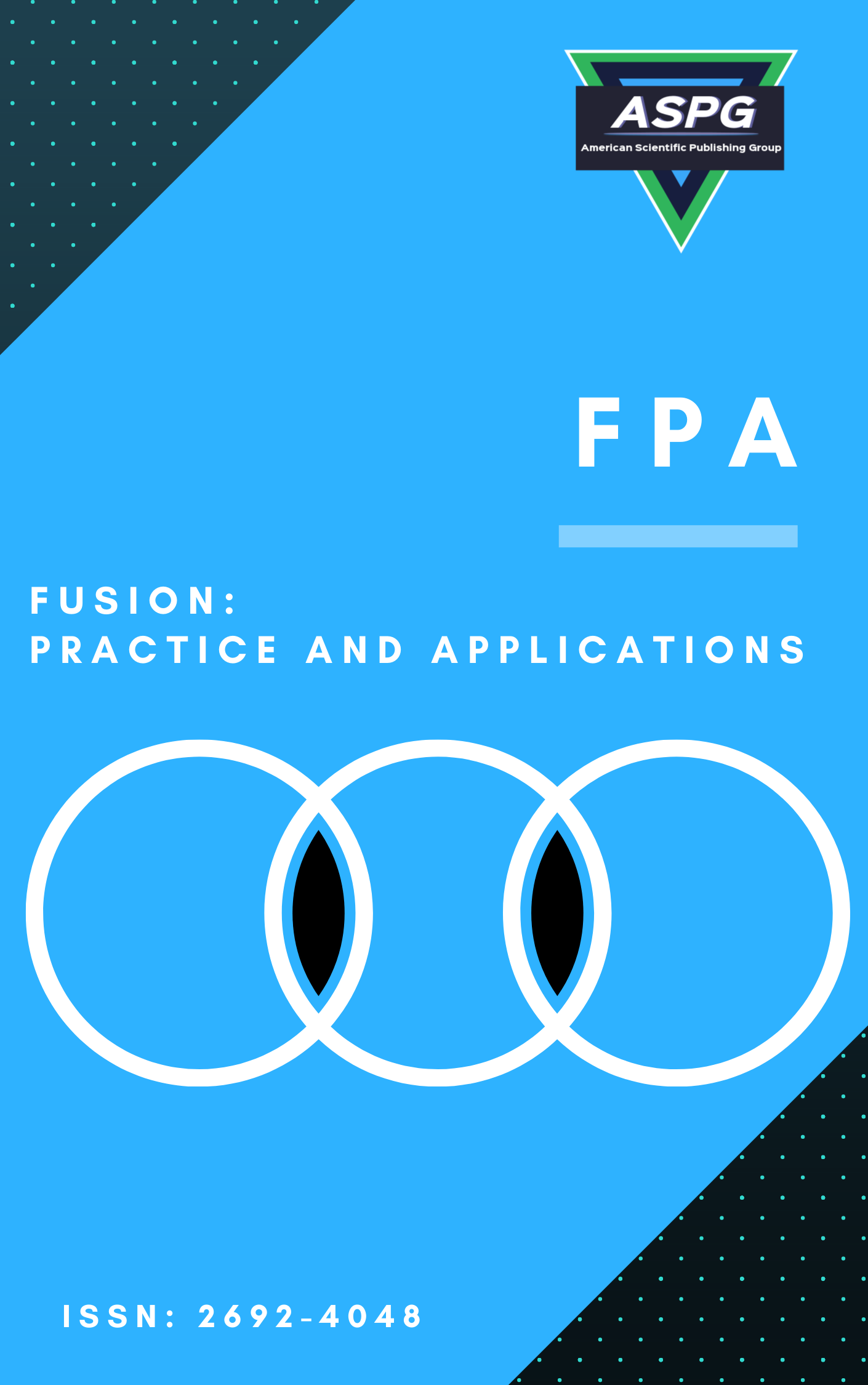

Volume 9 , Issue 2 , PP: 62-73, 2022 | Cite this article as | XML | Html | PDF | Full Length Article
Reem Atassi 1 * , Fuad Alhosban 2
Doi: https://doi.org/10.54216/FPA.090205
Healthcare transformation is becoming one of the highest priorities in a world whereby remarkable advances in technology are taking place. Recent healthcare data fusion management systems are centralized, which possess the probability of failure in case of a natural disaster. Blockchain has expanded fast to be the most widely spoken innovation that could address a large number of present data management problems in the health care sector. The usage of blockchain technology for the distribution of secure and safe health care datasets has received all the attention. This article presents a Bat Optimization Algorithm with Fuzzy Neural Network Based Classification (BOA-FNNC) Model for Blockchain Assisted Healthcare Data Fusion Environment. The presented BOA-FNNC technique mainly focuses on achieving security in the healthcare sector using BC technology. For accomplishing this, the BOA-FNNC technique performs BC assisted data transmission in the medical sector. Besides, the VGG-16 model is exploited for the creation of feature vectors. To classify healthcare data, the BOA with FNN model is utilized in this study, where the BOA fine tune the parameters related to the FNN model which in turn boosts the classifier efficiency. For illustrating the betterment of the BOA-FNNC technique, a series of experiments were performed. The comparison study reported the enhancements of the BOA-FNNC technique over other recent approaches.
Blockchain , Healthcare , Fusion Optimization , Fuzzy neural network , Bat algorithm , Security , Classification
[1] Imran, M., Zaman, U., Imtiaz, J., Fayaz, M. and Gwak, J., 2021. Comprehensive survey of iot, machine learning, and blockchain for health care applications: A topical assessment for pandemic preparedness, challenges, and solutions. Electronics, 10(20), p.2501.
[2] Kamruzzaman, M.M., Yan, B., Sarker, M.N.I., Alruwaili, O., Wu, M. and Alrashdi, I., 2022. Blockchain and Fog Computing in IoT-Driven Healthcare Services for Smart Cities. Journal of Healthcare Engineering, 2022.
[3] Kelli, V., Sarigiannidis, P., Argyriou, V., Lagkas, T. and Vitsas, V., 2021, June. A cyber resilience framework for NG-IoT healthcare using machine learning and blockchain. In ICC 2021-IEEE International Conference on Communications (pp. 1-6). IEEE.
[4] Li, Y., Shan, B., Li, B., Liu, X. and Pu, Y., 2021. Literature review on the applications of machine learning and blockchain technology in smart healthcare industry: a bibliometric analysis. Journal of Healthcare Engineering, 2021.
[5] Gunanidhi, G.S. and Krishnaveni, R., 2021. An experimental analysis of blockchain enabled intelligent healthcare monitoring system using IoT based deep learning principles. Annals of the Romanian Society for Cell Biology, pp.353-362.
[6] Otoum, S., Al Ridhawi, I. and Mouftah, H.T., 2021. Preventing and controlling epidemics through blockchain-assisted ai-enabled networks. Ieee Network, 35(3), pp.34-41.
[7] Singh, S., Rathore, S., Alfarraj, O., Tolba, A. and Yoon, B., 2022. A framework for privacypreservation of IoT healthcare data using Federated Learning and blockchain technology. Future Generation Computer Systems, 129, pp.380-388.
[8] Singh, P.D., Kaur, R., Dhiman, G. and Bojja, G.R., 2021. BOSS: A new QoS aware blockchain assisted framework for secure and smart healthcare as a service. Expert Systems, p.e12838.
[9] Abou-Nassar, E.M., Iliyasu, A.M., El-Kafrawy, P.M., Song, O.Y., Bashir, A.K. and Abd El-Latif, A.A., 2020. DITrust chain: towards blockchain-based trust models for sustainable healthcare IoT systems. IEEE Access, 8, pp.111223-111238.
[10] Islam, N., Faheem, Y., Din, I.U., Talha, M., Guizani, M. and Khalil, M., 2019. A blockchain-based fog computing framework for activity recognition as an application to e-Healthcare services. Future Generation Computer Systems, 100, pp.569-578.
[11] Bhattacharya, P., Tanwar, S., Bodkhe, U., Tyagi, S. and Kumar, N., 2019. Bindaas: Blockchain-based deep-learning as-a-service in healthcare 4.0 applications. IEEE Transactions on Network Science and Engineering, 8(2), pp.1242-1255
[12] Abbas, A., Alroobaea, R., Krichen, M., Rubaiee, S., Vimal, S. and Almansour, F.M., 2021. Blockchainassisted secured data management framework for health information analysis based on Internet of Medical Things. Personal and Ubiquitous Computing, pp.1-14.
[13] Lakhan, A., Mohammed, M.A., Kozlov, S. and Rodrigues, J.J., 2021. Mobile‐fog‐cloud assisted deep reinforcement learning and blockchain‐enable IoMT system for healthcare workflows. Transactions on Emerging Telecommunications Technologies, p.e4363
[14] Alqaralleh, B.A., Vaiyapuri, T., Parvathy, V.S., Gupta, D., Khanna, A. and Shankar, K., 2021. Blockchain-assisted secure image transmission and diagnosis model on Internet of Medical Things Environment. Personal and ubiquitous computing, pp.1-11.
[15] Al-Qarafi, A., Alrowais, F., S. Alotaibi, S., Nemri, N., Al-Wesabi, F.N., Al Duhayyim, M., Marzouk, R., Othman, M. and Al-Shabi, M., 2022. Optimal Machine Learning Based Privacy Preserving Blockchain Assisted Internet of Things with Smart Cities Environment. Applied Sciences, 12(12), p.5893
[16] Alharby, M. and van Moorsel, A., 2020. Blocksim: An extensible simulation tool for blockchain systems. Frontiers in Blockchain, 3, p.28.
[17] Kim, B., Yuvaraj, N., Sri Preethaa, K.R., Santhosh, R. and Sabari, A., 2020. Enhanced pedestrian detection using optimized deep convolution neural network for smart building surveillance. Soft Computing, 24(22), pp.17081-17092.
[18] Liu, X.H., Zhang, D., Zhang, J., Zhang, T. and Zhu, H., 2021. A path planning method based on the particle swarm optimization trained fuzzy neural network algorithm. Cluster Computing, 24(3), pp.1901-1915.
[19] Shareh, M.B., Bargh, S.H., Hosseinabadi, A.A.R. and Slowik, A., 2021. An improved bat optimization algorithm to solve the tasks scheduling problem in open shop. Neural Computing and Applications, 33(5), pp.1559-1573.